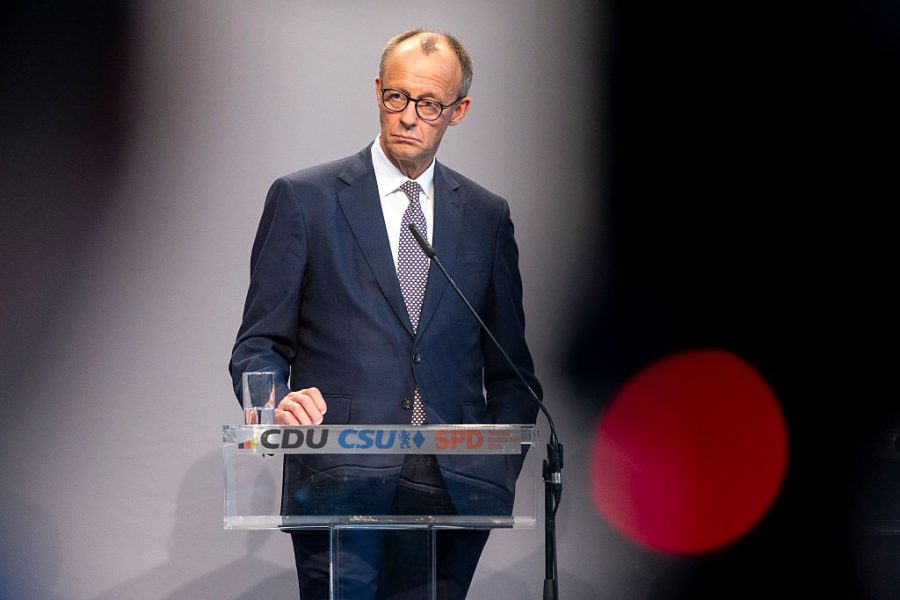It took just over six weeks for the new German coalition to form. That is very quick: in the past it has often taken months for parties to come to an agreement after elections. So what has made this process so smooth? I would like to think it was a sense of urgency, but I suspect it’s more to do with the programme being easy to agree on. The coalition treaty put together by the CDU and SPD parties is decidedly non-committal and unimaginative – a far cry from the change voters were promised.
The 146-page document had barely been released on Wednesday before one of its architects warned that some of its content may not be deliverable. Lars Klingbeil, leader of the centre-left SPD, the junior partner in the new two-way coalition, said that many of the outlined projects hadn’t been costed. That is why the treaty says ‘we want to’ rather than ‘we will’ a lot, he explained. Indeed, the phrase ‘we want to’ appears 150 times, so pretty much on every page.
There’s no ambition hiding beneath the ambiguity
But the nice-to-haves are not just about funding. They are also about masking the differences between the election-winning conservative CDU/CSU that promised drastic centre-right change and their new coalition partner, which has been part of governments since 1998 with just one interruption. They want to defend the left-wing status quo. And so there are phrases like ‘we want to remain an industrial country and achieve net zero’ or ‘we want to show in the next few years that Germany can move forward again’.
Because the phrasing is so vacuous, the parties’ differences on how to fill it with meaning are already apparent. Take the issue of immigration. The coalition treaty says that the new government will deny entry to people without a valid visa at the borders even if they are asking for asylum, but it will only do so ‘in alignment with our European neighbours’. So what does ‘alignment’ mean exactly? Do they just inform Poland or Austria, or do they require their permission to close German borders to migrants?
Jens Spahn, a prominent conservative politician, emphasised that the paper says ‘alignment not agreement’ (‘Abstimmung’ not ‘Zustimmung’). Saskia Esken, the second SPD leader at the negotiating table, retorted that it was ‘highly dangerous’ to deny migrants entry without the consent of the affected neighbouring countries. She argued that that’s what the two parties had agreed to do when they negotiated behind closed doors ‘and that’s what we’ll stick with’. And the designated chancellor Friedrich Merz? He said his priority is ‘the safety of our own country’, but he also wants to avoid ‘unnecessary conflict’ with the other European states. The question remains unanswered.
One could argue that the coalition treaty is an act of strategic ambiguity. It allows the two coalition partners to get going and work things out along the way. After all, they have made sure they have enough cash to make it a smooth journey, agreeing to spend up to €1 trillion (£867 billion) of extra borrowing on infrastructure, defence and security. This should free them up to fund other projects out of the regular budget.
But there’s no ambition hiding beneath the ambiguity. Take Germany’s massive headache of energy procurement. Before the war in Ukraine, Germany imported over half its gas from Russia. Then sanctions kicked in and triggered an energy crisis as the country scrambled around the world market to replace Russian gas with alternatives, mostly from Norway and the US. It’s difficult to disentangle German energy imports from Europe’s in general because of the integrated energy network. However, the EU imports nearly 20 per cent of its gas from the US now, and of the LNG that arrives directly in German ports, 84 per cent is American.
With Donald Trump in the White House and Vladimir Putin in Moscow, it doesn’t take much to work out that relying on gas imports as heavily as Germany’s rapacious economy does is a rather precarious gamble. Instead of diversifying and improving domestic energy production, the previous government shut down the last perfectly functional nuclear reactors in 2023. This was a decision criticised by Merz and other conservatives at the time. Yet there is absolutely nothing in the coalition treaty on investing in nuclear energy, as many of Germany’s neighbours are, or finding other solutions to this dangerous conundrum.
Instead, the plan on energy is to build more gas plants and to invest more in renewables. That’s without knowing where the gas is going to come from or how Germany is going to negotiate a decent price for it when everyone knows it relies on gas imports. Renewables have also been expanded more quickly than the electricity network or storage solutions. The system came dangerously close to breaking down at times last year.
At other times, when there is no wind and no sun, Germany has had to take so much power out of the European network that it has affected other countries, particularly Norway and Sweden – badly – creating unnecessary conflict with them. This happens so frequently that there is a German word for such weather: ‘Dunkelflaute’.
What applies to energy applies to other areas of the coalition treaty: it’s a document of tweaks, not ‘policy change’, as the conservatives promised their voters. That’s why so many of them have turned to the far-right Alternative für Deutschland (AfD) in droves. The AfD was the most popular party in a major poll for the first time this week, and all other recent polls are unanimous in predicting it would gain close to a quarter of votes right now if there were another election.
If Merz, his coalition, and the political parties involved want to survive the next four years, they have to fill their shell of a coalition treaty with real meaning and quickly. Suffering from economic, political and social malaise of a scale not seen in recent history, Germany needs a government willing to take action and infuse the country with a sense of optimism. The coalition treaty is not exactly an inspiring start. There’s little ‘can do’ and far too much ‘might do…maybe.’








Comments